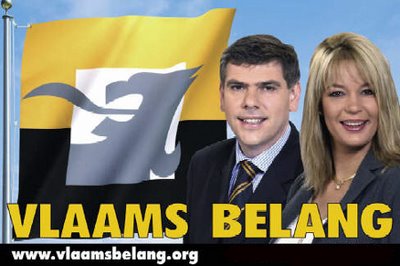Belgium's huggable fascists

normally I don't like to just post extended excerpts from a news article, but because my sitemeter stats suggest that most people are lazy and don't follow the links, here's an exception:
a familiar-sounding headline, this time regarding politics in Belgium,
from Jason Burke, in the Observer:
"Far right strives to disguise its roots in bid for national power"
[the] party is Vlaams Belang ('Flemish Interest'), one of Europe's most successful and newest far-right parties.
[...]
Filip Dewinter, VB's leader, believes that his party is the product of pan-European trends that is seeing radical groups forcing their way into the democratic mainstream. Speaking in the party's office in central Antwerp, he talked of 'a wave of support that is rising and that will going on rising'. He told The Observer: 'There is an explosive cocktail of factors. There is unemployment, immigration, a sense of insecurity... and traditional parties have no response.'
He also admitted that VB is a renamed version of Vlaams Blok, a party dissolved after being condemned for inciting racial hatred by a Belgian court two years ago. 'The style and the propaganda have changed, but we are the same party underneath,' he said.
Dewinter denied alleged links to neo-Nazi groups. However, opponents allege that the party has shadowy connections to violent far-right cells, such as the network of extremist militants armed with homemade bombs uncovered in the Belgian army recently. Many claim that the rhetoric of VB is a key factor in the rise in racist violence seen in the country of 11 million people in recent years. A young Belgian who opened fire on immigrants in Antwerp in May, killing two, was the son of a VB activist and the nephew of a VB member of parliament. 'There are mad people everywhere,' said Dewinter with a shrug.
Two of VB's main themes are immigration and Flemish nationalism. Though Antwerp is a cosmopolitan city with people from 140 nations, and especially large Jewish, Turkish and Moroccan communities which live together without serious problems, there has been little contact between ethnic groups. A recent study by the University of Leuven found that Belgian under-16s were as racist, if not more so, than their elders.
But the VB package is more varied than straight xenophobia. Ellen Samym, a 26-year-old adminstrator handing out VB leaflets in Deurne, said it was the Flemish nationalist theme that attracted her. Tensions between Walloon French-speakers in Belgium and the Flemish-speaking Flamands have been exacerbated by rapid economic growth in the Flemish parts and a growing social gap between the dynamic north and a poorer south. 'We pay too much tax that goes to the Walloons,' said Samym. 'We should be independent and then we could give the money to our own people.' For Dewinter, independence for Flanders is logical, not necessarily for economic reasons. 'They are of Latin genes, we are from Nordic racial stock,' he said.
The rise of Europe's new far right:
Austria Extreme right campaigning on anti-immigration ticket won more than 15 per cent of vote in elections this month.
Denmark Led by controversial woman Pia Kjaersgaard, the ultra-right Danish People's party swept into parliament as the third-largest party in 2001 with 12 per cent of the vote. It is more popular than ever, having received a major boost from the Muhammad cartoon controversy.
Switzerland The Swiss People's party takes an anti-immigrant line but its leader, Christoph Blocher, insists he is not racist. Elections in 1999 and 2003 made the party the largest single political force, with 27 per cent of votes cast. Last month a referendum backed Blocher's tough new laws on asylum seekers and immigrants.
France A persistent presence since 1972, the National Front and its ageing leader Jean-Marie Le Pen broke through at the 2002 presidential elections with six million votes. The FN, and other extreme right-wing parties, are predicted to do well in next year's election.
UK The racist British National Party, led by Nick Griffin, scored its best poll in May's local elections, with three council seats in Burnley, Lancashire. Because of the electoral system, the party is unlikely to gain MPs. Griffin wants to pay non-whites to return to their countries of ethnic origin and to withdraw Britain from EU.





<< Home